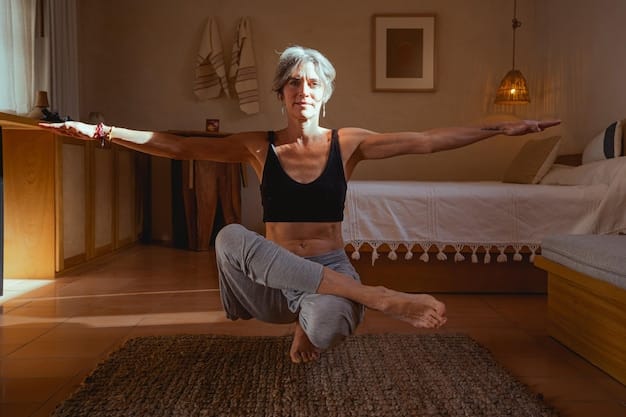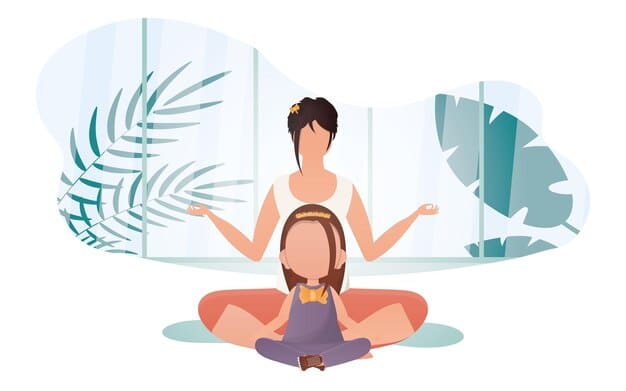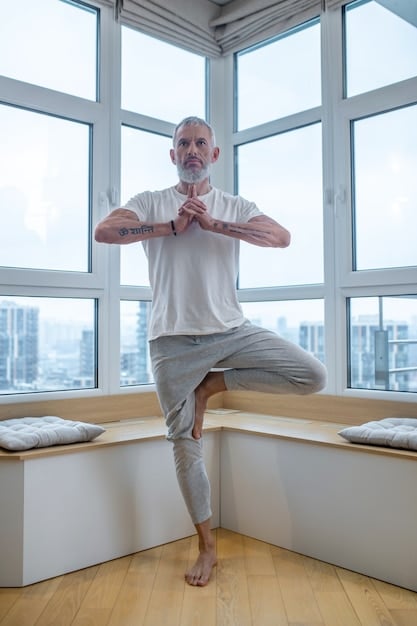Yoga for Sleep: New Research Shows 25% Improvement in Adults Over 40

New research indicates that regular yoga practice can significantly enhance sleep quality in adults over 40, with studies showing an average improvement of 25% in various sleep parameters.
Did you know that a gentle stretch and mindful breathing could be your ticket to a better night’s sleep? New Research: How Yoga Can Improve Sleep Quality by 25% in Adults Over 40 sheds light on the profound impact yoga can have on those restless nights, especially as we age.
The Science Behind Yoga and Sleep
Yoga isn’t just about flexibility; it’s a holistic practice that harmonizes the mind and body. Let’s explore the scientific reasons why integrating yoga into your routine can lead to more restful nights.
Stress Reduction
One of the primary ways yoga improves sleep is by reducing stress. Chronic stress can wreak havoc on your sleep patterns, leading to insomnia and fragmented sleep.
Regulation of the Nervous System
Yoga postures and mindful breathing exercises help regulate the autonomic nervous system, shifting it from a state of high alert (sympathetic dominance) to relaxation (parasympathetic dominance).
- Balancing Act: Yoga’s calming effect helps balance the nervous system, promoting deeper, more restorative sleep.
- Mindful Breathing: Techniques like deep, diaphragmatic breathing can lower heart rate and blood pressure, inducing a sense of calm.
- Reduced Cortisol: Regular practice can decrease cortisol levels, the hormone associated with stress, making it easier to fall and stay asleep.
- Enhanced HRV: Yoga improves heart rate variability (HRV), an indicator of the body’s ability to handle stress, which positively impacts sleep quality.
By addressing the underlying causes of sleep disruption, yoga offers a natural and effective way to improve sleep quality. It’s not just a temporary fix but a sustainable solution that enhances overall well-being.
Yoga Poses for Better Sleep: A Practical Guide
Ready to roll out your mat and improve your sleep? Here are several yoga poses known for their calming and sleep-inducing properties.

Supported Child’s Pose (Balasana)
This gentle pose quiets the mind and soothes the nervous system. It’s a great way to release tension and prepare for sleep.
Legs-Up-the-Wall Pose (Viparita Karani)
This restorative pose calms the nervous system, relieves tired legs and feet, and promotes relaxation.
- Gentle Inversion: Elevating your legs helps drain lymphatic fluid and reduces swelling.
- Calming Effect: This pose encourages deep relaxation by lowering heart rate and blood pressure.
- Easy to Practice: It requires minimal effort and can be done in bed before you drift off to sleep.
- Mind-Body Connection: Focusing on your breath in this pose enhances mindfulness and inner peace.
Incorporating these poses into your nightly routine can gradually improve your sleep quality. Remember, consistency is key—even a few minutes of yoga each night can make a significant difference.
The Connection Between Age, Yoga, and Sleep
As we age, our sleep patterns change, often leading to increased sleep disturbances. Yoga can be an invaluable tool in mitigating these age-related sleep issues, as highlighted by new research.
Hormonal Changes Impacting Sleep
Hormonal shifts during midlife, like menopause in women, can cause hot flashes and night sweats that disrupt sleep.
Decrease in Melatonin Production
Melatonin, a hormone that regulates sleep, naturally decreases with age. This can make it harder to fall asleep and stay asleep.
- Balancing Hormones: Certain yoga postures and breathing exercises may help regulate hormonal imbalances, reducing sleep disruptions.
- Boosting Melatonin: While yoga can’t directly increase melatonin production, it can create a more conducive environment for its release by reducing stress and promoting relaxation.
- Improved Circulation: Gentle movements and stretching can enhance blood flow, helping to alleviate discomfort and improve overall well-being.
- Mindful Acceptance: Yoga teaches us to accept and work with our bodies as they change, reducing anxiety around sleep and promoting a more positive mindset.
For adults over 40, yoga becomes more than just a physical practice; it’s a holistic approach to navigating age-related sleep challenges, fostering resilience and improving overall quality of life.

Creating a Bedtime Yoga Routine
Setting up a consistent bedtime yoga routine is essential for reaping its sleep-enhancing benefits. Here’s how to create a routine that suits your needs and preferences.
Timing is Everything
Aim to practice yoga at least an hour before bedtime to allow your body and mind to wind down.
Choose Calming Poses
Focus on gentle, restorative poses that promote relaxation, such as Child’s Pose, Legs-Up-the-Wall, and Corpse Pose (Savasana).
- Consistency: Stick to your routine as much as possible, even on weekends, to reinforce your body’s natural sleep-wake cycle.
- Environment: Create a calming atmosphere with dim lighting, soft music, and comfortable attire.
- Breathing Techniques: Incorporate deep, diaphragmatic breathing or alternate nostril breathing (Nadi Shodhana) to calm your nervous system.
- Listen to Your Body: Adjust poses as needed and avoid pushing yourself too hard. The goal is relaxation, not physical exertion.
By incorporating these elements into your routine, you can create a personalized yoga practice that enhances sleep and overall well-being. Start slowly, be patient with yourself, and enjoy the process of discovering what works best for you.
Other Lifestyle Factors to Complement Yoga
While yoga can significantly improve sleep quality, it’s most effective when combined with other healthy lifestyle habits. Let’s explore these complementary factors.
Dietary Considerations
Avoid heavy meals, caffeine, and alcohol close to bedtime, as these can disrupt sleep patterns.
Creating a Sleep-Conducive Environment
Ensure your bedroom is dark, quiet, and cool. Use blackout curtains, earplugs, or a white noise machine if necessary.
- Regular Exercise: Engage in regular physical activity, but avoid intense workouts close to bedtime.
- Consistent Sleep Schedule: Go to bed and wake up at the same time every day, even on weekends, to regulate your body’s natural sleep-wake cycle.
- Mindfulness Practices: Incorporate other mindfulness techniques like meditation or deep breathing to reduce stress and promote relaxation.
- Limit Screen Time: Avoid screens (phones, tablets, computers) for at least an hour before bed, as the blue light can interfere with melatonin production.
By integrating these lifestyle changes with your yoga practice, you can optimize your sleep environment and enhance the overall effectiveness of your sleep improvement efforts. It’s about creating a holistic approach to wellness that supports your body’s natural rhythms and promotes restful sleep.
Real-Life Success Stories: Yoga and Sleep Improvement
Hearing from others who have successfully used yoga to improve their sleep can be incredibly motivating. Here are a few inspiring stories.
Sarah, 45
Sarah struggled with insomnia for years due to work-related stress. After incorporating a nightly yoga routine, she experienced a significant improvement in her sleep quality, falling asleep faster and staying asleep longer.
David, 52
David, a retired teacher, found that yoga helped him manage his anxiety and improve his sleep. He now enjoys more consistent and restorative sleep, leading to increased energy and overall well-being.
- Improved Sleep Quality: Many individuals report falling asleep faster, experiencing fewer awakenings, and enjoying more restful sleep.
- Reduced Stress and Anxiety: Yoga’s calming effects help manage stress and anxiety, leading to better sleep and overall mental health.
- Enhanced Physical Well-being: Regular yoga practice improves flexibility, reduces pain, and promotes physical comfort, all of which contribute to better sleep.
- Holistic Approach: Yoga provides a holistic approach to wellness, addressing both the physical and mental aspects of sleep, leading to long-term improvements.
These real-life success stories demonstrate the transformative potential of yoga for improving sleep. If you’re struggling with sleep issues, consider giving yoga a try—it might just be the solution you’ve been looking for.
| Key Point | Brief Description |
|---|---|
| 🧘 Yoga & Sleep | Yoga can improve sleep quality by 25% in adults over 40. |
| 🧠 Stress Reduction | Yoga helps regulate the nervous system and reduce cortisol levels. |
| 🌙 Bedtime Routine | Consistent practice before sleep enhances sleep quality. |
| 🍎 Complementary Factors | Combine yoga with healthy diet and sleep environment. |
FAQ
▼
Yoga reduces stress and regulates the nervous system, promoting relaxation and better sleep. Specific poses and breathing techniques help lower heart rate and blood pressure.
▼
Restorative poses like Supported Child’s Pose and Legs-Up-the-Wall are excellent for calming the mind and preparing the body for sleep. Corpse Pose (Savasana) is a great finisher.
▼
Ideally, practice yoga nightly for at least 15-20 minutes. Consistency is key to reaping the benefits. Even a few minutes can make a difference in your sleep quality.
▼
Yes, yoga can help mitigate hormonal changes and reduce stress, which often contribute to sleep disturbances in older adults. It promotes physical and mental well-being.
▼
Maintain a consistent sleep schedule, create a sleep-conducive environment, avoid screens before bed, and consider other mindfulness practices like meditation. Diet changes can also help.
Conclusion
Integrating yoga into your nightly routine can be a game-changer for improving sleep quality, especially if you’re over 40. By reducing stress, regulating the nervous system, and promoting relaxation, yoga offers a natural and effective solution for achieving more restful nights. Combine it with healthy lifestyle habits for optimal results.





